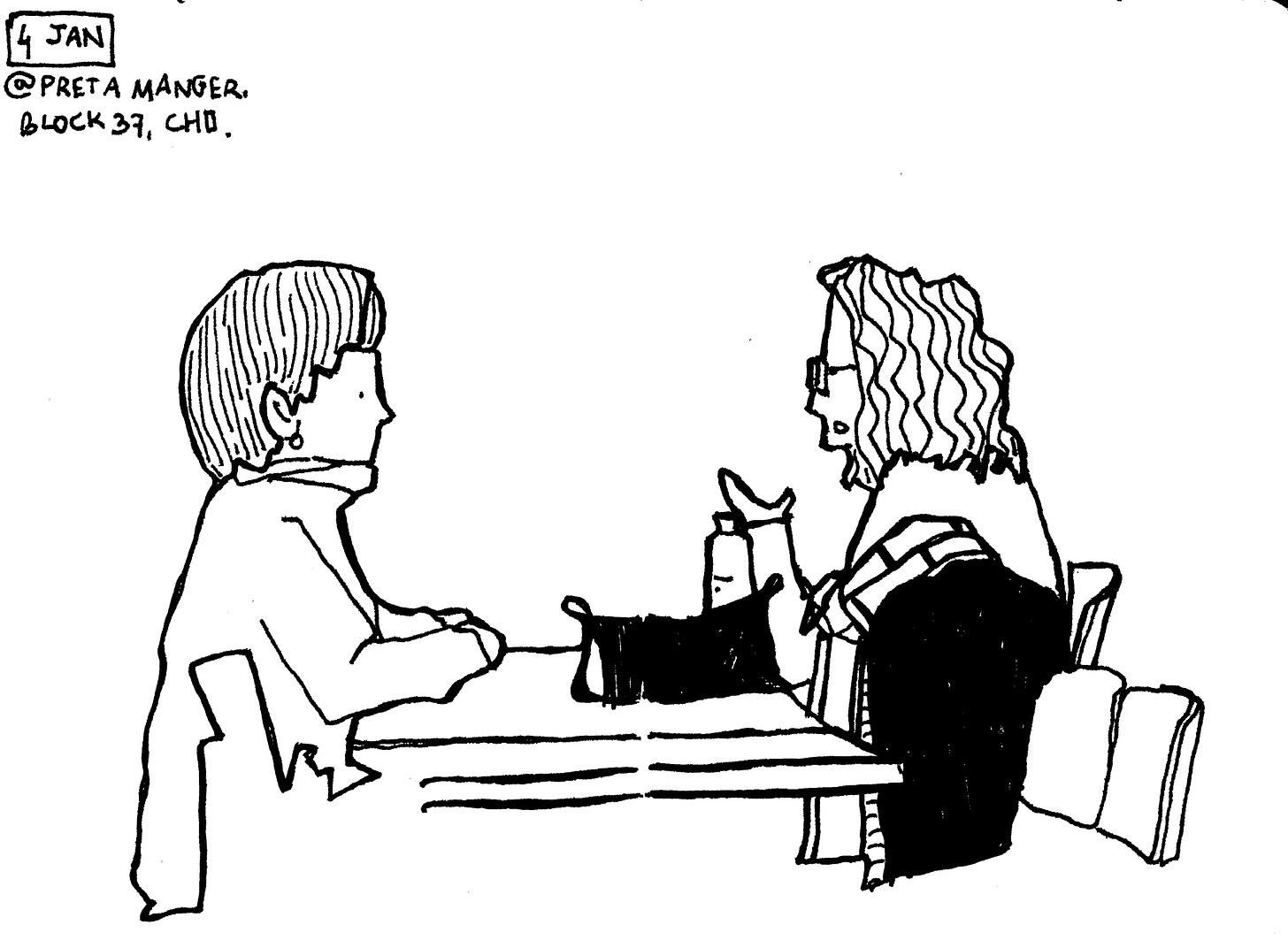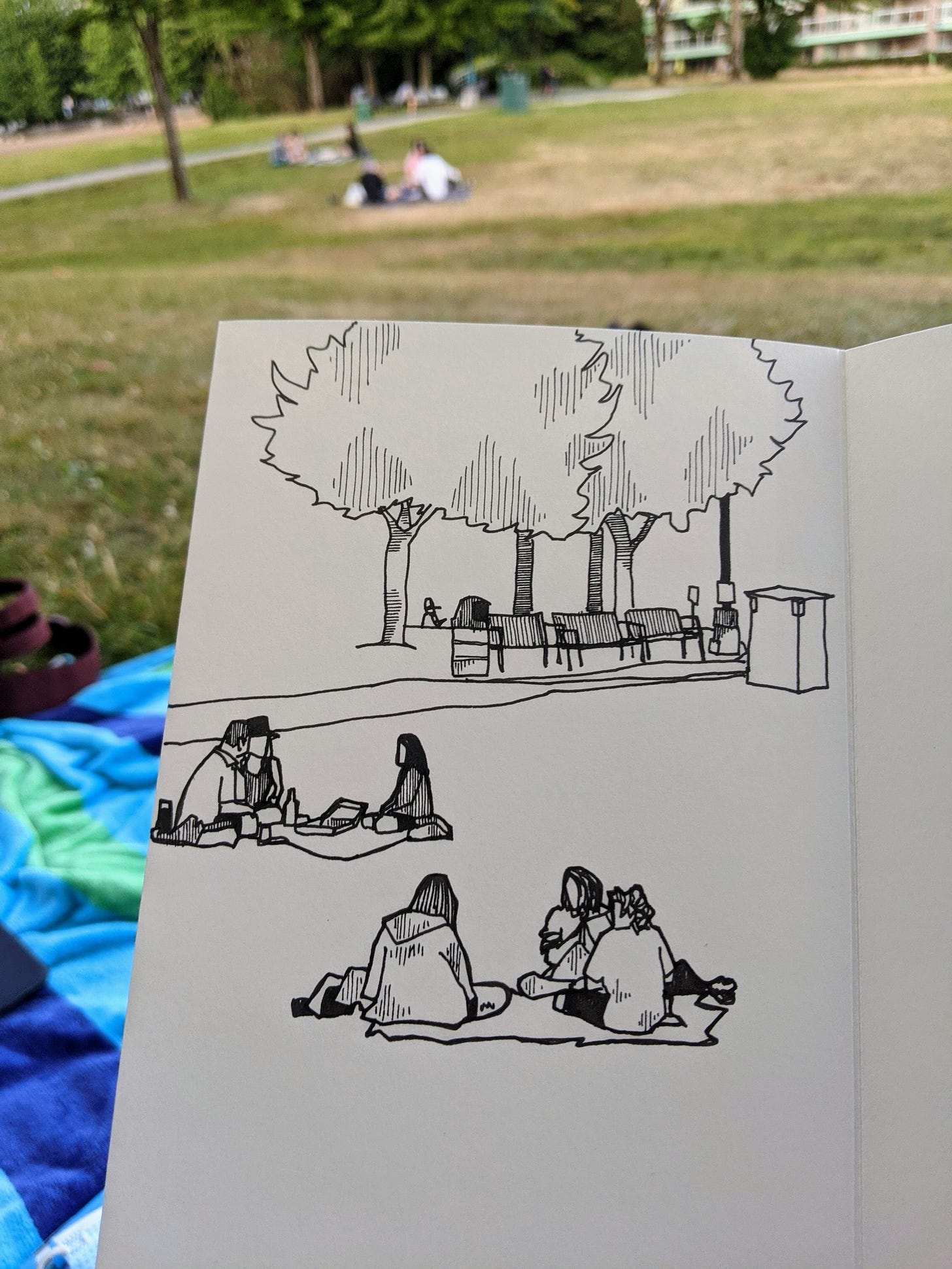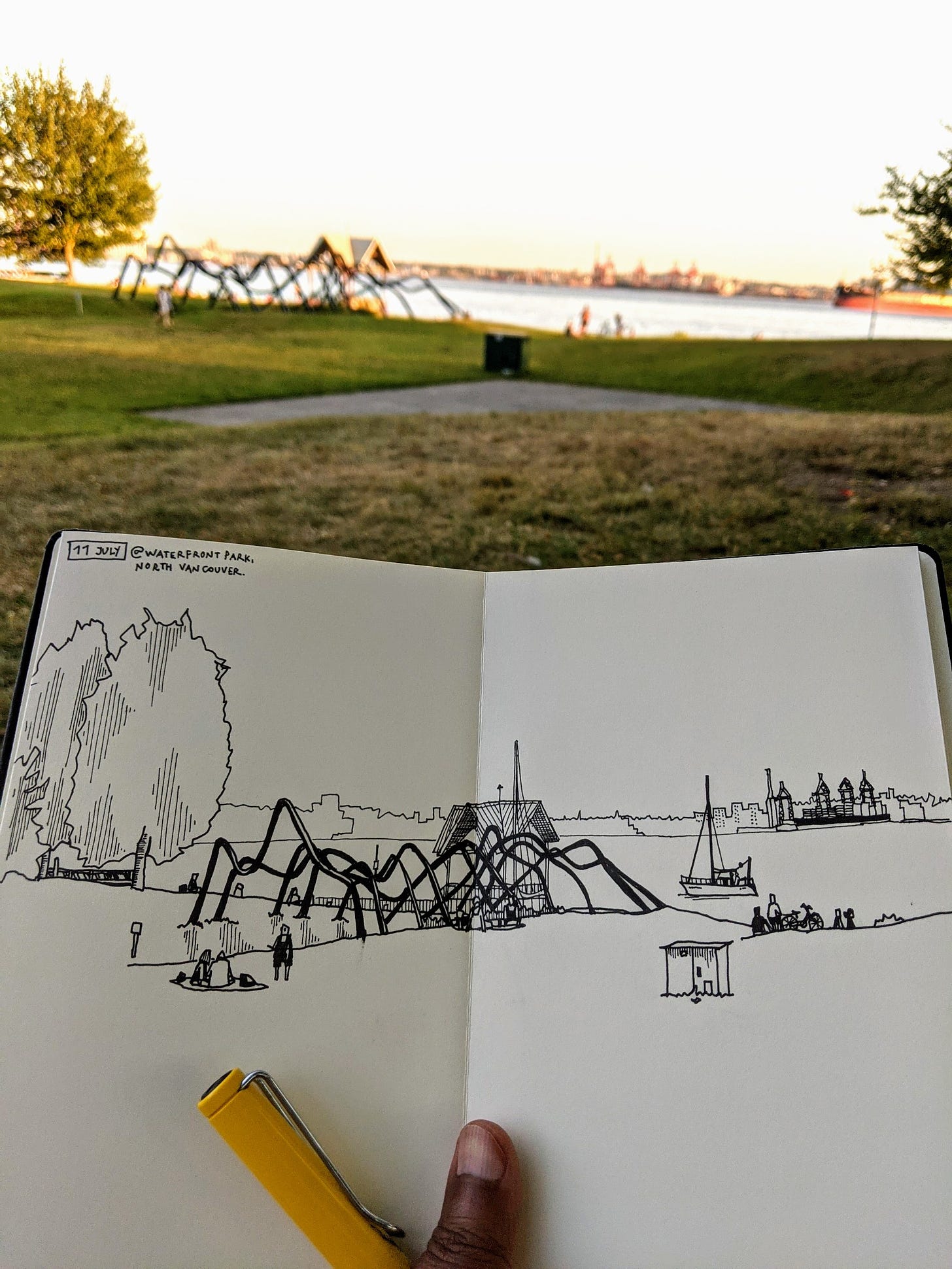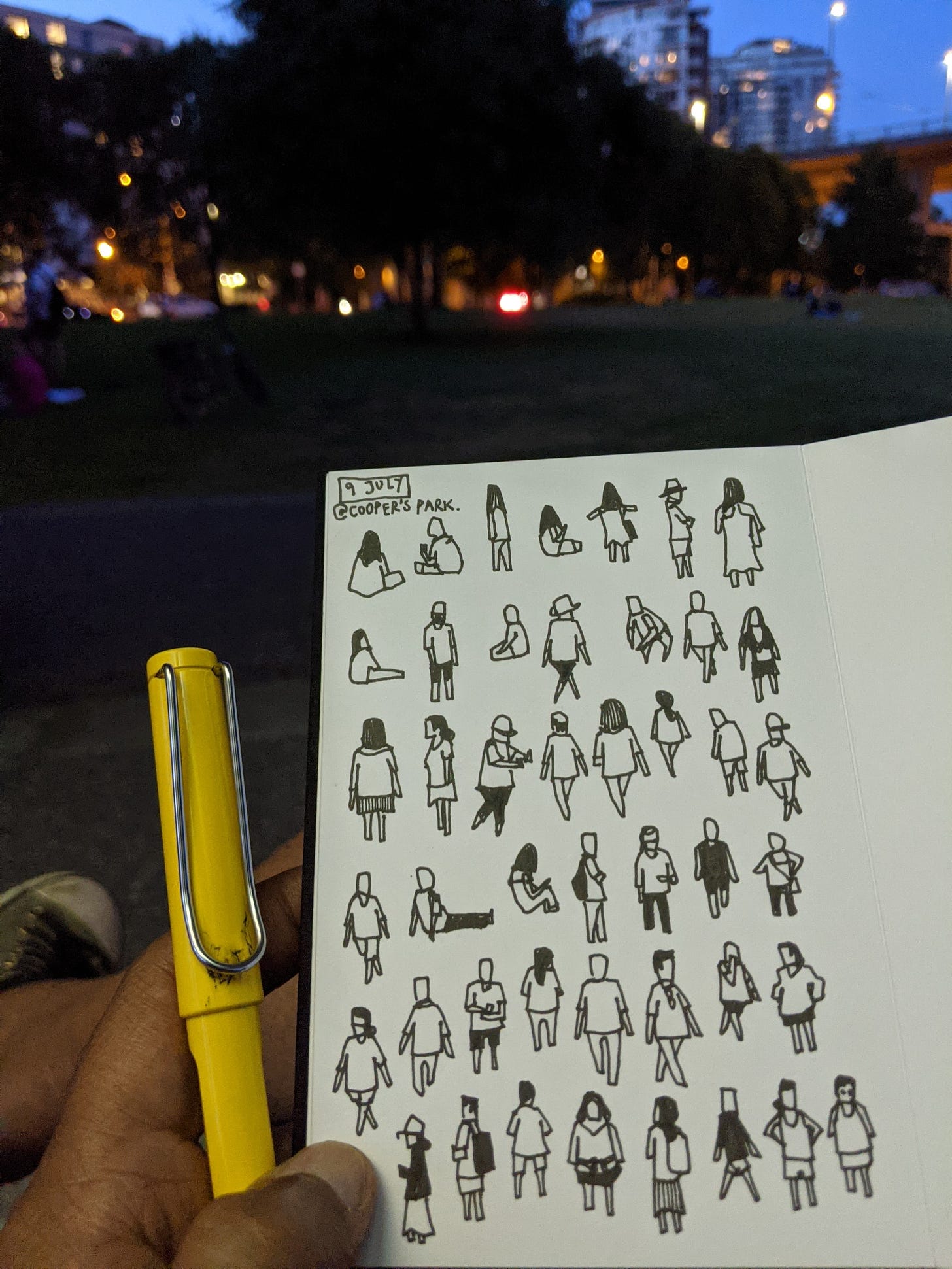54 - Capturing the Spirit of Mumbai
This week, a new episode of the podcast, some drawings, and some words.
Welcome to all new subscribers. If you enjoy this newsletter, consider sharing it with a friend.
Ep 22 - Capturing the Spirit of Mumbai with Zainab Tambawalla
In the latest episode of the SneakyArt Podcast, I speak with Mumbai-based artist, illustrator and urban-sketcher Zainab Tambawalla (IG), about her sketch-reportage project to tell the stories of 6 artisans practicing their trades in the city of Mumbai, India.
Zainab visited the workplaces of different artisans in the city - potters, wood-carvers, goldsmiths, sculptors, basket-weavers, and tailors - to illustrate their working conditions and share their stories. Titled ‘Spirit of Mumbai’, her project is a testament to their resilience in the face of economic turmoil and the enormous hardships of the last 2 years. Her project urges us to notice the lives of people who otherwise remain at the edges of our tunnel vision. It invites us to pay attention to our urban landscape in a more conscientious and empathetic manner.
I speak with Zainab about her journey to become an artist, her work in the animation industry, and her turn towards becoming a freelance illustrator. What does urban sketching have to offer someone who has been drawing and painting their entire life? We talk about the value of exploring new media and styles of expression. With relation to the USk Mumbai community, we discuss how drawing on location can help us appreciate the culture and history of the places we live in.
Listen to our conversation on your choice of streaming service, or use the link below!
Asking Questions
This week I recorded two episodes on alternate days, and it was … exhausting!
But this is a good thing. Both my guests do fantastic work that I have admired for several years. And they were interesting not only for their art but also for the trajectory of their work and lives. I learned many good things!
I am a curious person with lots of questions. Curiosity drives all my learning, and it also guides all the conversations I have. But a virtual conversation can be a strange thing, especially when it is the first conversation you’re having with someone.
First conversations often tend to be surface-level conversations. When I listen to podcasts featuring 20-30 minute interviews, I am reminded of how surface-level conversations work. Or how they don’t work.
“Every statement is a lie.” - Derrida.
Jacques Derrida, philosopher of Deconstructionalism, explained that every party in a conversation uses words in their own way, with their own ideas about phrase and sentence and context and subtext. Simply put, words mean different things to different people. In fact, any conversation between two people is actually a conversation between four people - the first person speaking to who they think the second person is, and the second person responding to who they think the first person is. We talk past each other. Nothing is heard and nothing is understood. Every statement is a lie.
[When I first read about Derrida, I wrote about how this manifests on social media and real-life political conversations.]
So in my episodes I take the long way around this problem, by asking lots of questions and letting my guests speak without interruption. Every conversation has its own tempo, which is set by the guest, while my job is simply to keep the wheels turning. Good questions are important too. This is what Socrates did, using good questions to peel away the layers behind the rules, laws, and customs, that we take for granted.
Why this? Why not that?
The idea is not to be contrarian, but to arrive at a logical and rational understanding for a certain thing. Asking good questions to delve deeper is an important tool for every host and interviewer also articulated as the “Theory of the 3 Whys”.
This is also the way of philosophy. The founder of phenomenological thought, Edmund Husserl, urged his students to reject all labels, perceptions, metaphors, and inherited ideas, and get to “the things themselves”. It was a process of ‘bracketing’ or suspending biases and judgments, for which he used the ancient Greek word, epoche.
[Read what I previously wrote about existentialism and phenomenology as they apply to SneakyArt.]
In order to understand a person, therefore, it is worth the effort to get past the metaphors and idioms and biases - the epoche - and get to the things themselves. It can take time, but this is where the magic lies.
In these recent conversations, I think I am better able to tell when I reach that point. I know I’m close the first time that they lean forward to offer an anecdote. When their eyes light up as I formulate my question, I know we’re almost there. And when they add their own stories to my observations, I know we have started hitting the sweet spot. Every podcast conversation is a race to reach this sweet spot, and once there, to stay in the zone.
I didn’t mean to get philosophical about all this! The point was just to share that I’ve had two, long, exhausting, enriching conversations this week. And I’m excited to share them with you soon. There is good stuff in there. Real magic.
This Week in SneakyArt…
As the sun set on the western edge of the world, shadows crept along the soft, cool grass. Soon we were completely out of the sunlight. We watched the angled rays of light gleam on treetops and throw colors against stray clouds in the darkening sky. All was silent but for the murmur of distant conversation, and an occasional cry of laughter piercing the cool air. Along the horizon, a boat sailed on infinite, smooth waters.
We went for a walk after dinner one evening and met with a friend who described her torturous WFH conditions. Apparently Amazon does not pay you well and demands very long hours. Bad Amazon. While she vented, I made some quick observations of life passing us by.
I learned that Coopers’ Park is not named after a person, but after the profession of cooping. There was a Cooperage at this spot until the 80s. Coopers are the people who make wooden barrels and casks and tubs. Did you know?
Reading
I’m reading Factotum by Charles Bukowski. Like all Bukowski, it is depraved and immoral and enlightening. You might know Bukowski even if you have never read his novels. He was a poet. He wrote this -
Buy Me A Coffee
In the emerging creator-economy, both creators and fans are empowered by being able to create and support the content they like. As an independent creative, one of my goals this year is to build a strong creator-fan relationship which mutually benefits both parties. On my BuyMeACoffee page, fans are able to support me with one-time cups of coffee, or monthly memberships in exchange for exclusive privileges.
For example, last week I offered members a chance to pose a question to upcoming guests. Another extra I offer is a bonus commentary with select episodes. Here is the latest bonus commentary for Episode 21, where I talk about storyboards in films.
If this interests you, check out my page using this link. Buy me a coffee, and let’s talk! :)
Next week, I will have some more words and some more SneakyArt. Thank you for reading!










